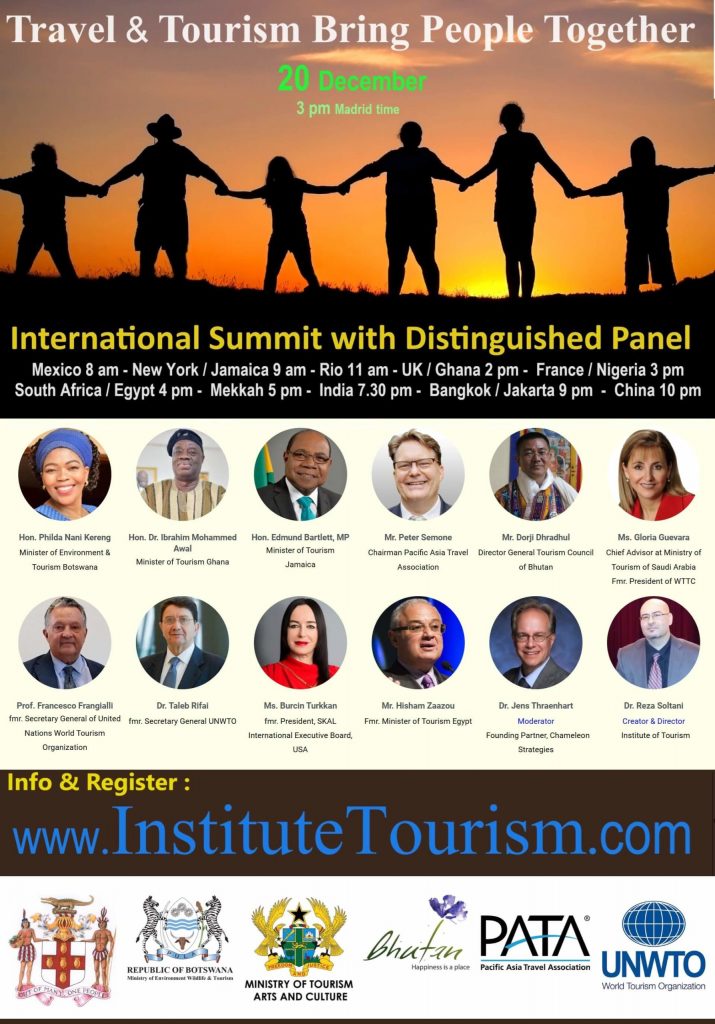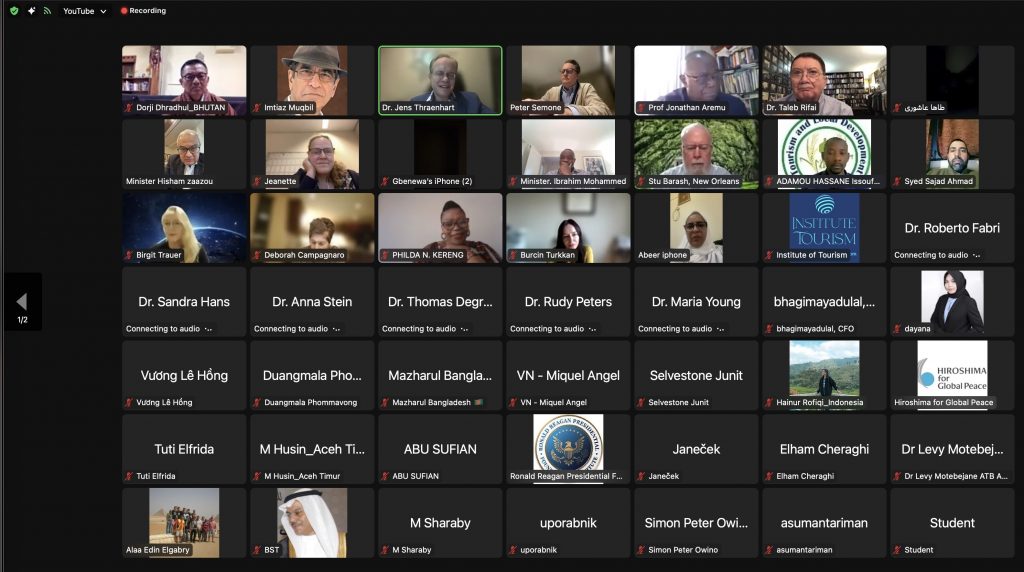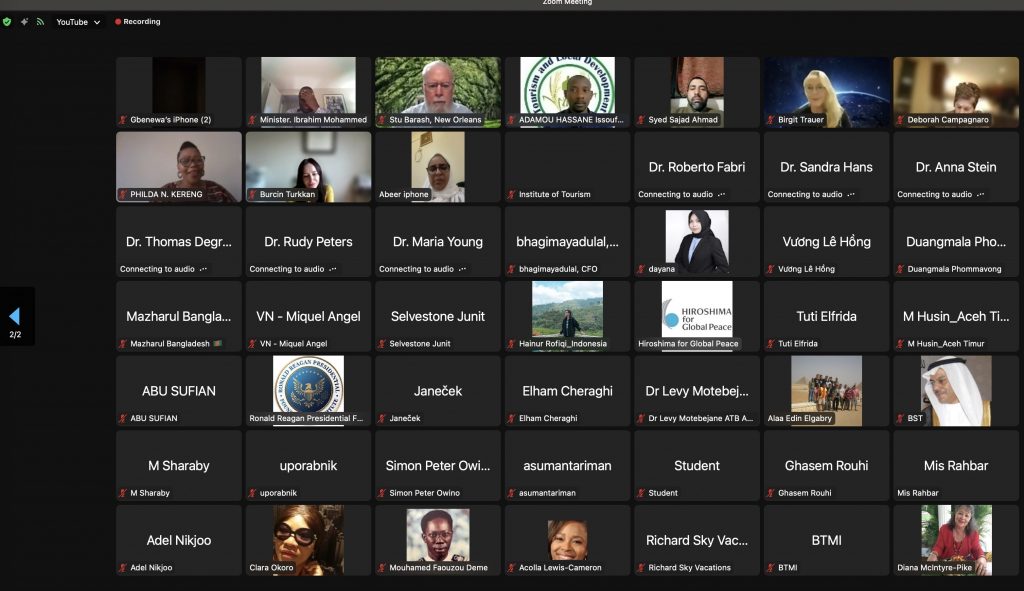
21 Dec, 2023
PATA Chairman, an American, blasts global geopolitical unrest as “existential threat” to tourism
Bangkok — Mr Peter Semone, the American chairman of the Pacific Asia Travel Association, has unleashed a blistering attack on the “ethnocentrism and extreme views” dominating the political discourse in his country. “America used to be a melting pot where anyone could succeed regardless of your place of birth, race, creed, religion, or ethnicity. The American Dream was something that many aspired to. Sadly, the America that I grew up is changing rapidly.”
Speaking at a webinar organised by the Institute of Tourism on 20 Dec, Mr Semone said, “The current geopolitical unrest taking place across the globe is an existential threat to the travel and tourism industry. Without peace there is no tourism. Think about it. If we as tourism leaders don’t speak out against wars such as the one taking place in Israel and Palestine, we will all be out of a job and we will have failed our respective constituencies and stakeholders.”
He added, “Some of the rhetoric propagated by politicians across the globe is toxic, disgraceful and dangerous. It has the potential to put us on a collision course with the inherent dangers of racism and intolerance, which will instigate more war — much like what we are experiencing in the Middle East, Ukraine and other corners of the globe today.”

Arguably the first time that the leader of any global tourism organisation has spoken out forcefully on the geopolitical, social and cultural impact of conflict on tourism, Mr Semone’s comments could prove to be a game-changer by paving the way for the otherwise taboo topic to be mainstreamed on the agendas of tourism forums and conferences worldwide. (The full text of Mr Semone’s comments follow below).
The webinar was organised by the Institute’s Creator and Director, Mr Reza Soltani, and moderated by Founding Partner, Chameleon Strategies, Mr Jens Thraenhart. It was a follow up to an earlier one on “Tourism and War” also organised by the Institute of Tourism on Oct 31, just a few weeks after the Oct 7 outbreak of hostilities in the Middle East. The situation has deteriorated significantly since then and is dangerously close to becoming a wider war.
In a later Q&A, Mr Semone called for a Year of Peace Tourism in 2025 to celebrate the role of tourism in rebuilding post-war countries and regions such as Rwanda and the Greater Mekong Subregion. His comments were roundly welcomed by a number of other panelists, facilitating a robust discussion of the relationship between peace, conflict and tourism and the negative role played by mainstream politicians and media.
Former UN World Tourism Organisation Secretary-General Dr Taleb Rifai cited the negative ripple-effect of the Israel-Palestine war on his home country Jordan. Chiding the United States as a country that has championed “many good things” but now taken a “wrong attitude” on the current war, he said, “If we don’t discuss this openly we will never be able to achieve peace in the way we want to achieve it.”
Another former UNWTO Secretary-General Francesco Frangialli, recapped personal experiences of his visits to Jordan, Palestine and Israel, and openly criticised by name former Israeli Prime Minister Ariel Sharon and the current PM Benyamin Netanyahu, both known as anti-Arab/Muslim extremists, for their role in the decades-long conflict. He noted the oddities of the situation whereby well-heeled Israelis, not allowed to have casinos in their own country, instead go to Jericho in Israeli-occupied Palestine to play the tables there.
Mr. Hisham Zaazou, former Minister of Tourism, Egypt, also cited the negative impact of conflicts and political upheavals, such as the ongoing Israeli bombing of neighbouring Gaza and the Arab Spring of 2010-11 when he had just taken over as Minister.


A number of concrete follow-up ideas emerged from the discussion:
Mrs Philda Nani Kereng, Minister of Environment & Tourism, Botswana, said she had just returned from attending the COP28 in Dubai and was very impressed by how the Emirate had become a melting pot of cultures and religions, where Christmas, Diwali and Ramadhan were all equally celebrated and connected people to culture, history and heritage.
She called for more to be done to link the cultural and environmental heritage of Africa and the Arab world, noting that her positive experience on a Desert Safari in Dubai had prompted a thought about replicating the idea in the Kalahari desert in her own country. She also called for more global scientific discussion about the negative influence of wars and conflict, and more documentaries to be made on the topic.
Mr. Dorji Dhradhul, Director General Tourism Council of Bhutan, said that it was time for the global tourism industry to adopt a universal theme song that would reflect the peace and humanity theme of the immortal John Lennon song, “Imagine”. His proposal was supported by Mr Raed Habiss of Saudi Arabia, in the audience.
Ms. Burcin Turkkan, former President, SKAL International Executive Board, USA, called for the media, especially the travel trade media, to publicise and reinforce the relationship between tourism and peace, to offset the overwhelmingly negative and divisive coverage in the mainstream TV channels and social media.
The full webinar has been uploaded here http://www.institutetourism.com/together
Here is the full text of Mr Semone’s remarks:
OPEN TEXT
The current geopolitical unrest taking place across the globe is an existential threat to the travel and tourism industry.
Without peace there is no tourism.
Think about it. If we as tourism leaders don’t speak out against wars such as the one taking place in Israel and Palestine, we will all be out of a job and we will have failed our respective constituencies and stakeholders.
At the Pacific Asia Travel Association or PATA, we believe that there is enormous potential to bring the world together through tourism. Asia and the Pacific is home to all of the world’s major religions. It is a living museum and a kaleidescope of the most unique and precious cultures known to mankind.
Tourism boosts the revenue of economies, creates million of jobs, develops infrastructure, and plants a sense of cultural exchange between foreigners and the local host community.
Tourism can help to unite people by promoting cultural exchange, creating shared experiences, providing economic benefits, and promoting peace and understanding.
During the course of my travels, I have experienced how interacting with people from different countries results in an exchange of not only dialogue but also cultures, that ultimately builds and strengthens ties.
Our news media is filled with bad news that is often politicized for profit, personal agendas and self interest.
There is a lot of fear mongering in this day and age. This results in countries, religions and cultures being misrepresented and mischaracterized.
The United States – where I was born – is subject to a high degree of ethnocentrism and extreme views of people and places that are different to what the average American is accustomed to. Strange situation for a country that was built on the backbone of immigrants. America used to be a melting pot where anyone could succeed regardless of your place of birth, race, creed, religion, or ethnicity. The American Dream was something that many aspired to. Sadly, the America that I grew up is changing rapidly.
Some of the rhetoric propagated by politicians across the globe is toxic, disgraceful and dangerous. It has the potential to put us on a collision course with the inherent dangers of racism and intolerance, which will instigate more war — much like what we are experiencing in the Middle East, Ukraine and other corners of the globe today.
For the past six months I have spent an enormous amount of time in China. I have rediscovered the beauty of the Chinese people and their culture. I have gained respect for their economic and political system. I have been reminded of the charm and rich cultural traditions of the Chinese people.
Through my own choice, I have become a tourism Ambassador for China and find myself reminding people of the dynamism of the Middle Kingdom.
Thanks to tourism, I have an understanding of China that I wouldn’t have if I only listened to the news reports warning of the imminent dangers of a strong China.
In recent months, I have created bonds with Chinese people that will last a lifetime. These people to people exchanges have helped me understand the Chinese perspective on life, family, friendship and even geopolitics.
If people from different countries establish such bonds with each other, over a period, it will play a pivotal role in creating strong positive linkages between nations. Through such connections, people will begin to understand, appreciate and respect each other’s cultures, values and beliefs, thereby leading to solid friendships and camaraderie that are the genesis and foundation of a long-lasting relationship.
Amidst all the tensions that we see across the world today, we must realize that ultimately, the larger section of the global community wants harmony. Imagine if the feeling of oneness and neighbourliness that we exhibit within our own local communities can be extended beyond borders.
Tourism has the power to do that. It helps open our minds, see different perspectives, experience different cultures and develop an understanding of the larger world and our fellow citizens of the earth, instead of living with pre-conceived notions or unwarranted grudges.
Of course, tourism is not the ultimate answer to years of social, political and economic conflicts between nations. That comes with its own complexities and sensitivities, but we as individuals can choose to leave all those complications behind and connect with each other on a human level through tourism.
Only by bringing people together through tourism can we ever hope to learn, share, laugh and inspire positive change.
It is time for our industry to raise our profile as a priority sector that is not only an economic force, but ALSO a conduit for peace and harmony amongst people.
END TEXT



Liked this article? Share it!